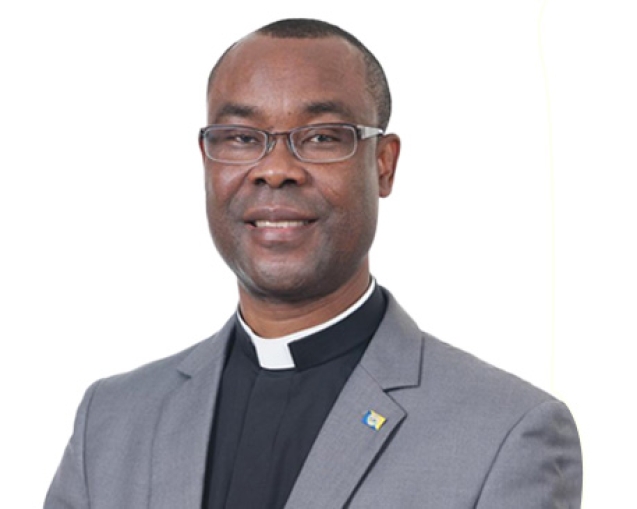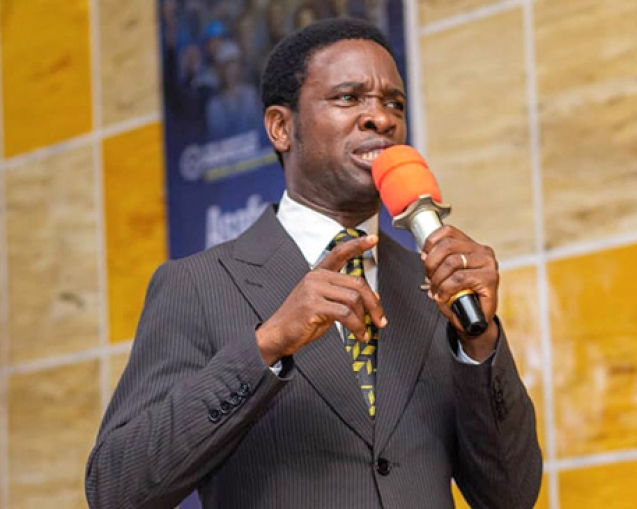Following the launch of the 2022 year’s theme, “Equipping the Church as an Army to Possess the Nations,” by the leadership of The Church of Pentecost, a lot has been taught, written and learnt about the ministry of intercession. To intercede is to use your influence to persuade someone in authority to forgive another person or save that person from punishment. Therefore, intercessory prayer is petitioning God to act on another’s behalf. Scripture urges all believers to intercede for others, communities, organisations, and nations.
Whiles the Christian fraternity sees it as a ministry, the business community may also view it as a serious business without which losses will be inevitable to the body of Christ. As a professional in the building industry, I would prefer to look at it as a project all believers must execute with definite timelines. The Cambridge dictionary defines a project as a piece of planned work or an activity that is finished over a period and intended to achieve a particular purpose. The project of intercession is, therefore, a well-planned activity of praying for others, institutions, and nations. Unlike all other projects, intercession continues unabated until intended purposes are achieved for new ones to be rolled onboard for the cycle to continue.
Most of us have countless testimonies about how God saved some loved ones, that church member, society or even the entire nation due to a fervent intercessory prayer mounted when the need arose. Even though it is primarily a prayer for others other than the self, I see it as an indirect prayer of society’s corporate welfare, including the self by extension. Taking the COVID-19 as an example, the fervent intercession the Christian fraternity mounted, including that of ongoing “Awurade Kasa” at the studios of PENT Tv, has gone a long way to deliver the nations from the destructive and ravaging works of the virus.
In Genesis 18:16-33, Abraham, affectionately known as the friend of God, mounted a fervent intercession for the twin city of Sodom and Gomorrah when he got the intelligence from God about its impending destruction. God hinted to Abraham about it because He expected him to do something about it by interceding for them, so he spared the entire city. If conservative estimates of the inhabitants of this twin city at the time is anything to go by, then we are looking at around 500,000 people God was about to judge owing to their wickedness. Abraham immediately approached God and began to engage Him on some attributes such as His fairness, faithfulness, mercies, love, and compassion in the light of the terms of reference given to the Angels of destruction. He asked God, “Will you sweep away the righteous with the wicked?” Abraham mainly counted on God’s perfect adjudication skills when he said, “Far be it from you! Will not the Judge of all the earth do, right? (Genesis 18:25b). Our intercession for family, the body of Christ and the nations must also be premised on God’s faithfulness, mercies, compassion, love and His covenant-keeping credentials instead of just complaining and weeping.
He then negotiated with God to implore Him to abandon the idea and spare the cities. Abraham’s first offer was for God to spare the twin city should the Angels find fifty (50) righteous people there. This was remarkable of a mighty intercessor or negotiator because offering 50 for what its worth 500,000 (representing 0.01% of the original figure or a 99.99% discount for a commodity) is a bold step. Indeed, it is equivalent to asking for the item to be given to you free of charge.
It must, therefore, be established that the project of interceding for others, institutions and nations has very little to do with their attitudes, behaviour, past or current lifestyles. It virtually tells Almighty God to intervene swiftly on behalf of others by mercy and not by merits. One would have thought Abraham would be “gentle” or “courteous” enough to increase his offer of 50 to say about 100 or better still, thank God for the 99.99% concession given for his request. Abraham remained steadfast to the project he had begun to save the entire nation from God’s judgment. In God’s presence, he proceeds to negotiate further downwards to 45 righteous people as a measure of attracting God’s mercies to the situation at hand. God obliged that request as well. He then interceded further and brought the number to 40 and, in all these instances pleading for God to contain the inconveniences he appeared to be causing Him. In the project of intercession, there is no such thing as trying to be gentle or appearing to be courteous to the situation at hand when precious lives, nations, and generations unborn are at stake.
When Abraham picked the signal that God was somehow giving him the needed attention and developing interest in the project he had set for himself, he brought the figure down to 30. Even though the Angels of destruction at this time had set off to carry out their mission because it was apparent God was in a hurry. However, any well-planned intercession we mount for others always crosses God at an intersection where His love and mercies bind Him to stop, wait, listen and consider our pleas. Abraham then asked for a further reduction of the number to 20. God did not ignore this request, even though the Angels were almost at the site for the mission to begin. In all the six (6) instances in Abraham’s intercession project from 50 to 10 righteous people, God answered him with, “The Lord said…” although it may appear that he was disturbing or wasting God’s time.
God answers the intercession we mount for nations and communities. It is never a bother to Him. It is worth noting that Abraham decided not to pre-occupy himself with the guilt, sins, LGBTQ+ happenings and corrupt deals of the people but rather remained focused on interceding for them. Can we, for a moment, re-focus our attention on God to save our dear nation from utter chaos and destruction other than dwelling on the corrupt and evil vices ongoing? Of course, there’s time to talk about the ills in our governance systems and proffer workable policies and strategies to mitigate them. However, in the mood of intercession, there must be minimal or no room for accusations.
I will, therefore, take this opportunity to thank Apostle Eric Nyamekye and his able Executive Council members for the numerous intercessory prayer interventions at all levels of the Church worldwide. Apart from the “Awurade Kasa” and others at the PENT TV studio, the nationwide inter-district prayer marathon and the current global intercession on Tuesdays have greatly relieved many individuals and households, institutions, and nations across the globe. The spiritually thick atmosphere is getting lightened by the day by God’s grace. May God continue to bless the leadership of our dear Church.
Someway somehow and quite instructive to today’s believers, Abraham dropped what I see as the bombshell and the anti-climax of the entire project when he said, “… but let me speak just once more. What if only ten can be found there?” (Genesis 18:32). Then God answered, “For the sake of ten, I will not destroy it.” Let us not forget that even though He appeared to be in a hurry with His Angels, this same God stopped over at Abraham’s end and told him everything about His pending judgment on the twin city. Even when the Angels had taken the lead to Sodom, He waited for Abraham and entertained a whopping 99.99% discount he tabled for discussion. God further allowed an additional 80% discount on whatever was left from 50 to 10 righteous people. Why Abraham decided to end this landmark intercession project at “10” when God was almost at the 100% discount mark in abandoning the mission of destroying the twin city baffles me. Abraham was just a step away from what Moses achieved with God in a similar scenario in Exodus 32:9-14 when He planned to kill all the Israelites and raise another nation for him to lead. After the intercession, Moses mounted on behalf of the children of Israel; scripture says, “Then the LORD relented and did not bring on his people the disaster he had threatened.”
The greatest mistake we make as believers is the practice of abandoning or the stoppage of intercession at those ungodly hours the Lord Himself had given almost all and is ever willing to finish it off wholly for His children. What made Abraham think he was boring or bothering God? Do you think God would not have agreed to a further reduction from 10 to zero to spare the entire nation? Let’s not stop what God has instructed us to do for others, institutions, and our homeland Ghana through intercession because He has a particular interest in that project. God is never tired of listening to our prayers for others, society, and the nation because it fits well into His divine scheme. Let’s, therefore, not get tired and shy of asking more for Ghana, our motherland. Genesis 18:33, “When the LORD had finished speaking with Abraham, he left, and Abraham returned home. Remember, Abraham decided to stop at “10” and not continue the intercession because he probably thought God had done His best for him. God, therefore, left Abraham after his last request, and the latter also returned home. Why stop interceding to return home when your toil of intercession is on the verge of bringing some individuals back on track and nations back on their feet? Concerning the Patriarchs of the Christian faith like Abraham, 1 Corinthians 10:11 has this to say, “These things happened to them as examples and were written down as warnings for us, on whom the culmination of the ages has come.” So, instead of criticising Abraham for not following through with the logical completion of that intercession project, let us soberly reflect and repent from the practice of abandoning the ministry of intercession when it is most needed.
We must also not dwell on our human weaknesses during the project of intercession; else, the devil takes advantage of that and robs us of our confidence as believers. Abraham said, “Now that I have been so bold as to speak to the Lord, though I am nothing but dust and ashes” (Genesis 18:27). Despite the perceived weakness he touted, the God of the spirits of all flesh had all the patience to wait, listen and act on his behalf. Repent from sinful lifestyles if you have been convicted of any sin but let us remain focused and continue to lift holy and tireless hands for Heaven’s attention.
Sadly, when we stop intercession abruptly, God leaves the negotiation or intercessory altar of engagement to carry out His judgment due to individuals and nations (Genesis 18:33). The Angels of destruction then arrived in Sodom, and God rained down, burning sulphur from Heaven, destroying the cities (Genesis 19:1, 24). The vegetation was equally destroyed, signifying their livelihoods and economic fortunes (Genesis 19:25). According to Genesis 19:27-28, Abraham saw the smoke and destruction from the very spot he stood to intercede for the people of Sodom and Gomorrah. Unfortunately, Lot’s wife became a casualty when she turned into a pillar of salt. When we stop the project of intercession, we are likely to lose some dear ones even if we are fortunate to survive the tide. Let us not wait until we gather at the altar of our churches to see with our eyes what we do not want to see for our dear nation.
It is, however, revealing to learn that even in the middle of judgement, God still allows space to give concessions anytime intercession is mounted. Just before God rained down the burning sulphur from Heaven, Lot pleaded with the Angels to let him and his family flee to the nearby town called Zoar. The Angel told him, “Very well, I will grant this request too; I will not overthrow the town you speak of. But flee there quickly because I cannot do anything until you reach it” (Genesis 19:21-22).
Therefore, the project of intercession can never be too late for God’s intervention because apart from Him not being subject and bound by times and seasons, He is the commanding officer commanding all of Heaven’s host and forces. Believers must quickly pick the right signals when things are not moving as expected for others, institutions and nations and lift a well planned and coordinated regime of intercession for God’s intervention. In Ezekiel 22:30, God said, “I looked for someone among them who would build up the wall and stand before me in the gap on behalf of the land so I would not have to destroy it, but I found no one.” He is, therefore, more interested and excited to see His children taking up the project of intercession than we can ever imagine.
Similarly, as Moses’ hand grew tired and lowered his hands in Israel’s battle with the Amalekites, Israel was losing the fight on the field (Exodus 17:8-13). Aaron and Hur then looked for a stone for Moses to sit on with their hands propped to remain steady throughout the military campaign. The staff of God Moses lifted on top of the mountain whiles Joshua and the troops fought on the ground represents the project of intercession the Lord expects believers to undertake for the Church till sunset or the end of the age. Is it not scary to learn that God’s children were suffering defeat in the hands of the enemy any moment Moses’ hands signifying intercession were dropping for whatever reasons? The Church of God, I believe, has entered the phase where believers must mass up and mount the mother of all intercession until the nations are possessed and flooded with Kingdom principles and values. Therefore, every support must be given to the “Moseses, Aarons and Hours” of our day, so the staff of intercession remains steady till every foe is vanquished.
Likewise, family life and households suffer damage anytime the “Abrahams” and the “Moseses” amongst them decide to stop at “10” or lower the flag of intercession to half-mast. In Numbers 12:1-13, God’s anger burned hot against Miriam and Aaron for speaking against Moses’ marriage life. Miriam was then struck with leprosy as a result by God. The rather swift project of intercession mounted by Moses on her behalf is what brought God’s anger down and restored her for them to live in continuous harmony as siblings. Moses cried, “Please, God, heal her!” Your guess would be as good as mine if Moses opted to stay vindictive or indifferent towards the plight of Miriam, as her sister, like some believers, are in the habit of doing.
In conclusion, when the project of intercession is grounded abruptly for whatever reasons, families, households, the Church in battle, and nations bear the brunt of it with massive and highly avoidable losses. Unlike Abraham, let us not stop at “10”. Let us make every effort to continue this all-important project at all levels until sunset when the mist would have been rolled away.
Written by Pastor James Orhin Agyin


















